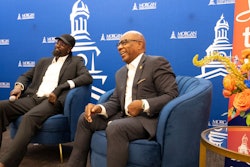In an “embarrassing moment” to witness, a British university’s vice-chancellor “beelined” for the only Black academic at a PhD reception, despite not having spoken to any other candidates. At a European research institute, the only Black female researcher was included in every possible photo, even when the subject of the photo opportunity was unrelated to her area of expertise.
One Black British academic felt “discriminated against for promotion” while white colleagues with fewer high-profile publications or research grants were promoted instead. Yet another noticed anti-Black racism increase at their institution when the university publicly declared its commitment to diversity, equity and inclusion (DEI).  Dr. Brian Burt
Dr. Brian Burt
These are just a a few of the experiences that 97 Black early-career academics (ECAs) in the United Kingdom recounted in written responses and interviews as part of a new report published Aug. 1. The report, titled “Unblocking the Pipeline: Supporting the Retention, Progression and Promotion of Black Early-Career Academics,” was the culmination of a monthslong survey of Black ECAs by the Higher Education Policy Institute, a U.K. think tank.
The results reflected problems that Black academics have always known to plague academia: institutional racism and insufficient support for Black ECAs that create barriers to job security and career advancement for Black academics. Fewer than half of the 97 Black ECAs surveyed reported feeling satisfied in their jobs or able to be themselves at work, and just a third felt that their workplaces were inclusive or their pay fair.
Many of the survey respondents felt their institutions inadequately supported them in advancing their careers, and most thought promotion and tenure criteria were too nebulous or unclearly articulated. Just 38% said they would feel comfortable reporting bullying or harassment to their institutions, despite 68% saying they had good relationships with their colleagues.
The report’s lead researcher, Dr. Becca Franssen, is a partner at the British talent-search firm GatenbySanderson, where she helps British universities fill executive roles. Franssen says that her experiences seeking out diverse candidates for those jobs drove her desire to work on the report, which is the first in a three-part series that will examine the experiences of Black U.K. academics in various stages of their careers.
“I would say that the pool is very small of diverse candidates,” says Franssen. “And we kind of hear talk about the leaky pipeline. There’s kind of Black academics in particular exiting academia at various stages. But I firmly believe that actually, the pipeline isn’t leaky. It’s blocked, and there are issues that prevent particularly Black ECAs from pursuing careers in academia.”














